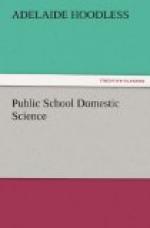One of the most important essentials in a sick room is perfect cleanliness of the room, the bed linen and clothing of the patient. Never air or dry cloths or garments in the sick room. Cover the broom with a damp flannel cloth in sweeping, so as to avoid noise and prevent the dust from rising. Avoid noise in placing coal on the fire by putting the coal in a paper bag, placing bag and all upon the fire. Do not allow loud talking or discussion in the sick room; neither is whispering desirable, as it is apt to irritate the patient. Do not consult the patient about the food, but see that tempting, wholesome varieties are provided, in accordance with the doctor’s orders concerning the diet. Serve food in small quantities, and either hot or cold, as the article may require. A warm dish which should be hot, and a tepid drink, or food, which should be cold, is one of the most objectionable and unappetizing forms of serving food. Do not allow fresh fruit, which is intended for the patient, to remain in the sick room, but keep in a cool place and serve when needed. Never visit a sick room when in a violent perspiration or with an empty stomach, as the system at that time is more susceptible to contagion.
One of the most important qualifications in a nurse is a thorough knowledge of the nature, use and digestibility, as well as the best methods of preparing the different kinds of food, so as to adapt them to the different forms of disease. In some cases, when the system has been overtaxed, either mentally or physically, a complete rest is necessary, and the diet should be food which merely satisfies the hunger—neither stimulating nor especially nourishing. Such foods come under the head of gruels, soups, jellies, fruit and drinks. On the other hand when a patient has become wasted from a long continued illness and requires building up, more nourishment is required to supply the waste. In some cases the food must be given in concentrated form. Milk is one of the most valuable foods in this class; sometimes it requires the addition of a little pepsin in order to facilitate digestion; sometimes the addition of a pinch of salt makes milk not only more agreeable to the patient, but aids digestion. Eggs, either lightly boiled or in egg-nog, are easily digested and very nourishing. Meat and milk soups, farina and oatmeal gruel, port wine jelly, albumen and milk (which is the white of egg and milk shaken together), and in some cases a bit of carefully broiled steak or chop, with dry toast, are suitable foods for this class of patient. In convalescence, any well cooked, easily digested food may be given. Fried food, rich puddings and pastry must be carefully avoided.
People with consumptive tendencies should eat wholesome, easily digested food, with plenty of fat, such as cream, butter, fat of bacon and of roast beef, mutton, olive oil, salads, cornmeal and cereals, and take plenty of outdoor exercise. Soups which have in them cream or milk are better for invalids than those containing a greater amount of gelatine. A few simple recipes are given, which are suitable for invalids.




